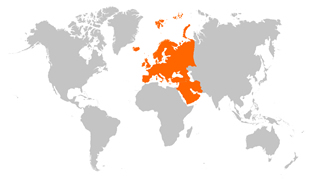To determine the scheduled time in your respective time zone, follow the hyperlink embedded in each respective time shown (this will launch in another window).
Design of mobile learning for individuals with disabilities
~Implications for research and practice~
 REGION: AMERICAS
REGION: AMERICAS
Wednesday, April 17, 0900 HAST (1400 CDT, 1500 EDT)
Description
Instructional designers engaged in mobile learning must consider the question of how to design learning experiences that are sensitive to ‘just in time,’ ‘just enough,’ and ‘just for me’ nature of mobile learning. However, designing effective mobile learning for individuals with disabilities presents a particular challenge. Disability spans a vast spectrum of diversity, making broadly generalizable design approaches largely untenable. Instructional design (ID) methodology that is sensitive to the exceptional nature of learners with disabilities is imperative. In this session, Dr. Schmidt presents a conceptual design model that is sensitive to mobile learning and user needs while at the same time being responsive to the realities of modern software design and development approaches.
Within the context of five National Institutes of Health (NIH) grants, Dr. Schmidt has developed mobile learning interventions for youth who have suffered severe and mild traumatic brain injuries (TBI) and their families as well as for youth with epilepsy and their families. Findings from extensive user-centered formative evaluations suggest that the interventions are highly feasible, acceptable to users, and usable. Session participants will gain insights regarding their own research and practices and will have opportunities to engage in related discussion.
About The Presenter
 Matthew Schmidt
Matthew Schmidt
University of Cincinnati, Cincinnati, Ohio, U.S.A.
Matthew Schmidt, PhD, is an associate professor at the University of Cincinnati in the Instructional Design and Technology program. As an applied researcher in the field of Instructional Design and Technology, his work focuses on the design, development, implementation, and evaluation of innovative educational courseware and computer software with a particular focus on individuals with disabilities. His research specifically investigates three-dimensional virtual learning environments, mobile learning, and immersive, hybrid learning environments.
Enhancing Students’ Engagement in English Class through Animated Movies
 REGION: ASIA / AUSTRALIA
REGION: ASIA / AUSTRALIA
Wednesday, April 17, 1400 HST
Description
In the digital era, teaching materials and students have changed along with technology advancement. Various media such as smartphone apps, digital textbooks, and YouTube video clips can be used in class as teaching materials. Students are skilled at handling these forms of media; therefore, teachers have to embrace this change to encourage student engagement. Movies, animated movies, and TV series are authentic materials to learn foreign languages and cultures. Different forms of media using the concepts of transmedia and incidental learning can be effective in giving students opportunities to fully enjoy and appreciate movies.
About The Presenter
 Yoon-Ah Rho
Yoon-Ah Rho
Kookmin University, Seoul, South Korea
Dr. Yoon-ah Rho, an assistant professor at Kookmin University in South Korea, has been teaching college-level English over 10 years. She is especially interested in teaching and learning English through media, such as movies, animated movies, and American TV dramas. She has presented at international and national conferences related to this theme. She serves as an academic advisor from STEM (The Society of Teaching English through Media) and a public relation officer from KATE (The Korea Association of Teachers of English).
Leveraging Student Diversity in Online Education
 REGION: EUROPE / MIDDLE EAST
REGION: EUROPE / MIDDLE EAST
Thursday, April 18, 0900 HAST
Description
Students today are from increasingly diverse backgrounds. This is especially true for online learning; it is more likely that students come from different cultural, socioeconomic, and educational backgrounds. As a result, there are challenges to the pedagogical design: making the course relevant and accessible for learners with different backgrounds; how to leverage the diversity of the participants in a way that enriches the learning experience for all.
Dr. Hanna Teräs has significant experience in leading, designing, teaching and researching online learning in various multicultural contexts. Based on her practitioner experience and her research outcomes, she discusses the challenges, successes, pitfalls and revelations associated with online learning and student diversity.
About The Presenter
 Hanna Teräs
Hanna Teräs
Tampere University of Applied Sciences, Tampere, Finland
Dr Hanna Teräs is Principal Lecturer (Digital learning environments) at Tampere University of Applied Sciences with international experience in research, development and practice concerning online learning, education technologies and adult learning. Dr. Teräs has:
- Collaborated with the World Health Organization (WHO) in developing fully online professional development programs for vaccine management in developing countries,
- Directed a fully online Postgraduate Certificate Program for teaching in higher education in the United Arab Emirates, as well as led a professional development project in digital pedagogies for the Faculty of Teacher Education at the University of Dar es Salaam in Tanzania.
- Lectured at Murdoch University, Australia, where her responsibilities included teaching and research in the area of education technology and digital learning environments.
- Published in international journals and books.